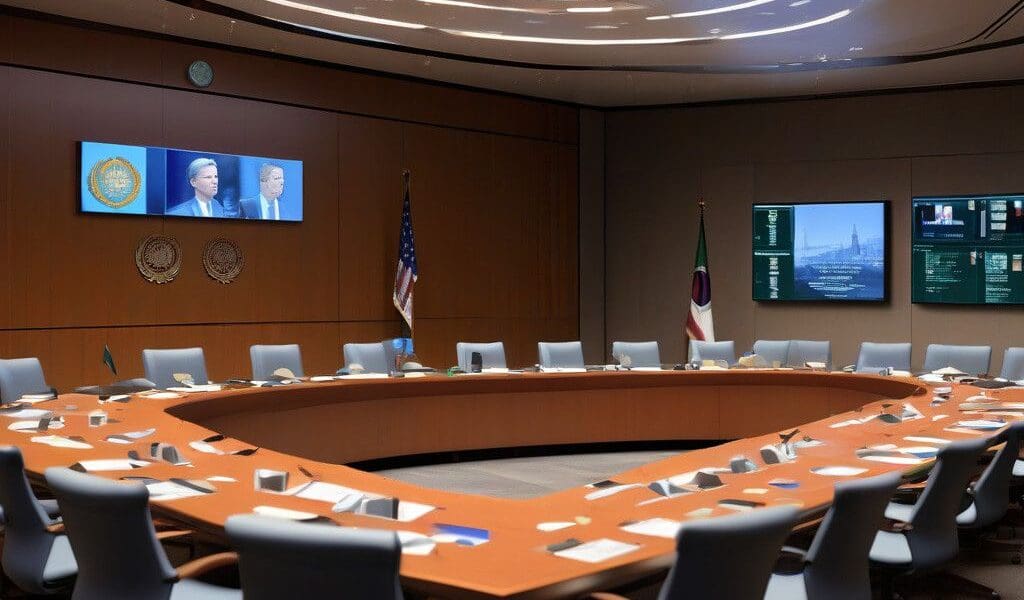Transforming Diplomatic Reporting with AI: The Case of DiploAI and the UN Security Council
In a world where information dissemination and timely reporting are crucial, the partnership between DiploAI and the UN Security Council (UNSC) marks a significant advancement in how diplomatic sessions are recorded and reported. This collaboration centers around the innovative application of artificial intelligence to enhance the accuracy and efficiency of reporting mechanisms within the Council.
The UNSC has a longstanding tradition of adopting new technologies to bolster its mission in maintaining international peace and security. By integrating DiploAI’s advanced AI tools in October 2023, the Council has taken a groundbreaking step in refining its reporting processes. During sessions on critical themes such as scientific development and women, peace, and security held on October 21 and 24 respectively, DiploAI’s contributions were pivotal in elevating the quality of discourse surrounding complex diplomatic topics.
This partnership exemplifies the synergy between technological innovation and deep domain expertise, aiming to deliver insights quickly and responsibly. Over the years, DiploAI has accumulated extensive experience in reporting on UNSC sessions, significantly enriching the Council’s knowledge ecosystem. This collaborative effort highlights the necessity of combining advanced technological solutions with expert analytical input from diplomats and UN officials.
The Process Behind the Partnership
The foundational aspect of this collaboration was the tailored approach towards AI that DiploAI undertook in conjunction with UNSC experts. This endeavor included building a specialized knowledge base that enhanced the AI’s contextual awareness through a steady stream of essential documents and session materials provided by the experts. This clarity in communication minimized any potential misunderstandings between the realms of technology and diplomacy, ensuring the AI tools met the specific needs of diplomacy.
A standout feature of this partnership was the collaborative analysis of the “A New Agenda for Peace.” This deep dive enabled the identification of over 400 critical topics that formed the backbone of a comprehensive taxonomy employed by the AI system. Such a meticulously crafted taxonomy, when combined with DiploAI’s technical capabilities, resulted in an AI framework that not only generates accurate outputs but is also finely tuned to the intricacies of diplomatic dialogues.
Additionally, a Knowledge Graph was introduced, offering a visual representation of sentiments and relational analyses among speakers and topics discussed during sessions. This added layer of analytical depth facilitates a richer understanding of the dynamics within the UNSC discussions.
Innovative Tools for Enhanced Reporting
Building on the developments mentioned earlier, DiploAI designed a custom chatbot that exceeds ordinary Q&A functions. Integrating all available session data and documentation from 2024, this chatbot allows users to engage conversationally with the content of the sessions. Users can now receive in-depth answers and real-time insights, transforming how diplomatic data is accessed and understood.
The Q&A module’s success, which underwent approximately ten iterations based on feedback from the UNSC, underscores the value of collaborative human-AI interaction. Each iteration was aimed at refining responses to align perfectly with the expectations and standards upheld by the UNSC. This iterative development process has empowered the AI to address critical inquiries with the necessary sensitivity required in diplomatic contexts.
Real-Time Reporting and Data Insights
One of the standout features of this partnership is the implementation of AI-driven meeting transcription. This advancement has facilitated real-time reporting and analysis, resulting in a deeper understanding and enhanced transparency within the diplomatic realm. By effectively combining immediate, context-rich insights, DiploAI is redefining the methodologies through which information is processed and disseminated, tailored specifically for the complex field of diplomacy.
The effectiveness of DiploAI’s tools can be illustrated through their impressive reporting metrics. An analysis of ten UNSC meetings from January 2023 to October 2024 revealed a staggering number of unique speakers (185) contributing to extensive dialogue that totaled over 201,221 minutes. The richness of the content was further evidenced by the over 396,172 words transcribed—equivalent to two-thirds of a novel like “War and Peace.”
Conclusion: A Promising Future for AI in Diplomacy
This innovative partnership between DiploAI and the UNSC is a prominent example of how artificial intelligence can enhance diplomatic efforts while firmly relying on human expertise and real-world needs. The blend of sophisticated AI systems and in-depth knowledge from experts illustrates the potential of such collaborations to improve the efficiency and impact of international diplomacy.
As the integration of AI technologies continues to grow in global governance, the model established by DiploAI and the UNSC underscores the importance of fostering partnerships that merge advanced AI tools with practical, subject matter insights. This partnership not only sets a benchmark for how diplomatic reporting can evolve but also offers a pathway to refine information flows in other areas of international relations.
AI, when harnessed effectively, can play a transformative role in diplomacy, enriching dialogues, enhancing transparency, and fostering a deeper understanding of intricate global matters. By paving the way for these advancements, DiploAI demonstrates the profound possibilities that lie ahead for the diplomatic community.








